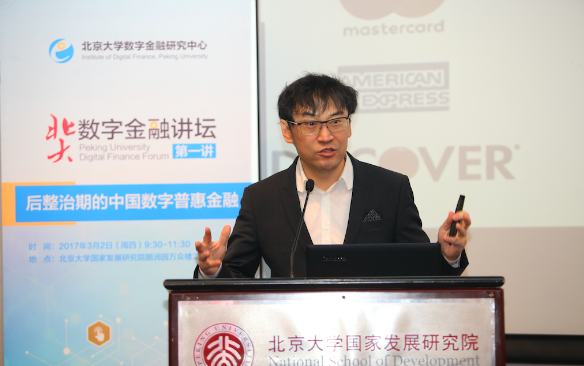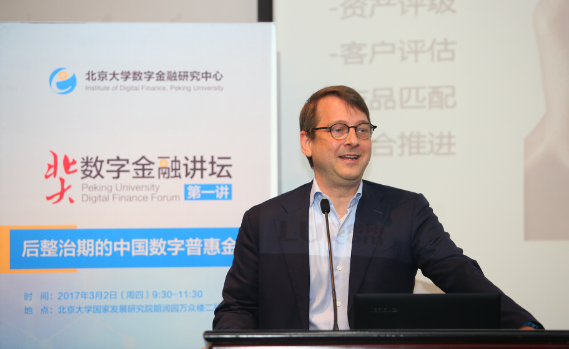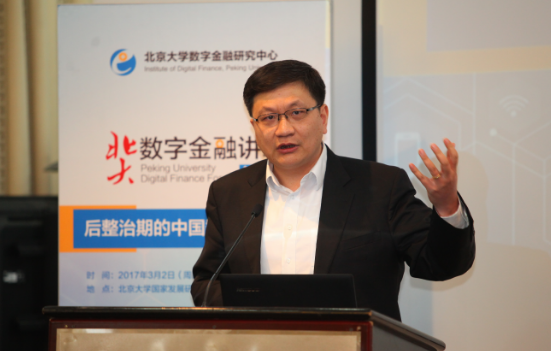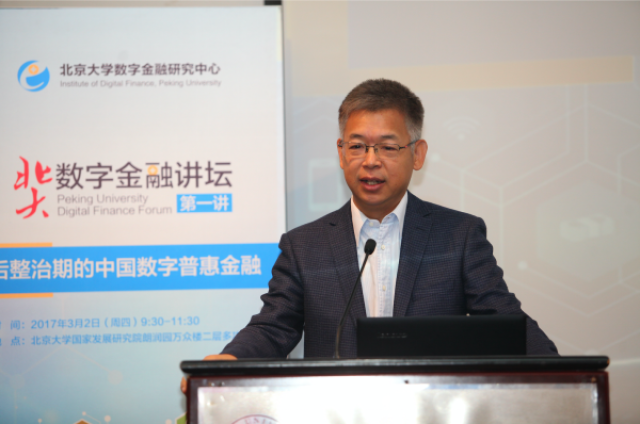The First Lecture of Peking University Digital Finance Forum ‘Digital Inclusive Finance in the Post-regulation Period’
2017-08-22
Recently, China’s digital inclusive finance has been developing fast and has played an important role in the global finance system, but it brings about significant risks at the same time. In August 2016, the China Banking Regulatory Commission, the Ministry of Industry and Information Technology, the Ministry of Public Security and the State Internet Information Office jointly issued Interim Measures for the Administration of the Business Activities of Online Lending Information Intermediary Institutions. In October, the General Office of the State Council issued the Plan for Special Rectification on the Risks of Internet Finance; meanwhile various supervisory and ministerial departments issued regulatory documents. We may wonder the development of digital inclusive finance in the post-regulation period.
On the morning of March 2, 2017, Institute of Digital Finance of Peking University (IDF) hosted Peking University Digital Finance Forum. In the first lecture, IDF invited three renowned authorities in related fields to discuss on China’s digital inclusive finance in the post-regulation period. The distinguished guest speakers included Chen Long, CSO of Ant Financial Services Group and Member of the Executive Council of IDF, Gregory D. Gibb, Co-Chairman and CEO of Lufax and Member of the Executive Council of IDF and Tang Ning, Founder and CEO of CreditEase (Executive Council Member of IDF). This lecture was hosted by Professor Huang Yiping, Vice President of National School of Development (NSD) and the Director of IDF.
Mr. Chen was the first to speak. He said the digital inclusive finance is the future that is happening. It has happened and will change our lives. A good finance is inclusive, beneficial, abundant and sustainable in commerce. On Double Eleven Festival, for example, eighty percent of the orders were completed via mobile client in the day and 97.5% of the phone calling or consulting were completed by artificial intelligence, reaching a peak of processing one hundred and twenty thousand orders per second ... Digital finance profoundly affects the consumption patterns, changes the financial model, reduces the cost of finance and greatly improves the efficiency. Mr. Chen summed up three big trends in digital finance. Trend one is the coming of cashless society. Trend two is the diversified credit system serving as the base of the digital financial system will serve more people. And the trend three is we will provide diversified and comprehensive financial services for small and micro businesses and individual users, break the distinction of functions and build a comprehensive financial life, regarding the users as the core. For example, Ants Forest tracks the carbon footprint and makes everyone’s green behaviors are tradable, measurable and configurable, combining with the public property and the financial attribute to solve the social problems effectively. At present, the model of digital inclusive financial practice in China are now known by the world and has great significance. The digital inclusive finance in the future should distinguish the digital inclusive finance from the inferior internet finance and protect the consumers. We should advocate the market mechanism, guide the industry to a better development, and make the digital technology reconstruct the financial services. We are supposed to be truly people-oriented, rely on the scene, return to the real economy, improve financial experience and solve the problems of people's livelihood. In short, the financial spirit is undergoing a profound reform.

Chen Long, CSO of Ant Financial Services Group, the Executive Director of IDF
Then, Gregory D. Gibb of Lufax talked about the chances and the challenges of the digital inclusive finance profoundly. The integration trend of the modern science and technology and finance is strengthening. Science and technology are reachable, convenient and efficient. They are involved in the finance through real-time data processing, cloud computing and artificial intelligence processing a huge amount of information, the static and dynamic behavior to make financial instruments into the competitive power of science and technology. In the next three to five years it will continue to upgrade. In the past the development of digital finance mainly depended on the channel advantage, making Internet finance go through the four leaps: leap from the middle-class investors to the small business owners, reducing the cost and accelerating the circulation speed; leap from the first-class cities to the second-class and third-class cities, improving the allocation of resources; leap from the insurance, securities, P2P etc. industries to the mobile terminal one-stop investment and payment; leap from China to the world. The core of the digital inclusive finance in the future is the data and the ability of processing. Digitalization has already become the driving of the Internet finance in the future, its rapid development will help people rate the risk, match the investment, price dynamically according to the changes of supply and demand and make intelligent and optimized decisions, etc. In addition, Internet financial regulation should focus on the integration with the traditional regulatory system, and become digital supervision, such as the use of license management, to avoid the high cost of the single system.

Gregory D. Gibb, Co-Chairman and CEO of Lufax, the Executive Director of IDF
Mr. Tang stressed that we should learn more about the seriousness rationally. We need to consider different situations, different perspectives, solve the financial problems case by case. When it comes to the application of large data, he compared the financial scene involved all the industries and the whole society with the small micro financial payment and the budget hotel booking light application not involving big financial risk. He thought big data in a serious financial scene is easy to produce big problems if it just ‘guess what you like’, and it also needs a considerable regulatory and financial logic. In addition, he suggests that digital finance needs not only digital technology but also financial technology and we need understand the seriousness of finance. In the last, he shared the understanding of Chinese credit industry development. In the past ten years of development has made some progress and the regulatory rules solved the moral hazard. In the next three to five years, he hopes the Chinese personal credit system can really developed, under the leading of the Central Bank and digital financial, digital inclusive financial enterprise and the system under the central bank management can realize data sharing and information exchange, to fundamentally avoid the phenomena that one person owns more than one debt or debt application, thus to achieve a soft landing of the personal credit risk instead of a hard landing.

Tang Ning, Founder and CEO of CreditEase, the company of the executive director of IDF
At the end of the forum, Prof. Huang Yiping, the Director of IDF concluded the rapid expansion of Internet finance from June 2013 did make a lot of difference but also a lot of risk. We firmly believe that under the government's regulation, the industry will develop better. There should be market logic and technical logic in the development of digital finance in China. Never forget that the core of finance is still the understanding, the respect and the awe of the law of finance.

Prof. Huang Yiping, Vice President of National School of Development and the Director of IDF